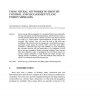Free Online Productivity Tools
i2Speak
i2Symbol
i2OCR
iTex2Img
iWeb2Print
iWeb2Shot
i2Type
iPdf2Split
iPdf2Merge
i2Bopomofo
i2Arabic
i2Style
i2Image
i2PDF
iLatex2Rtf
Sci2ools
116
click to vote
IM
2003
2003
Using Neural Networks to Identify Control and Management Plane Poison Messages
: Poison message failure propagation is a mechanism that has been responsible for large scale failures in both telecommunications and IP networks: Some or all of the network elements have a software or protocol ‘bug’ that is activated on receipt of a certain network control/management message (the poison message). This activated ‘bug’ will cause the node to fail with some probability. If the network control or management is such that this message is persistently passed among the network nodes, and if the node failure probability is sufficiently high, large-scale instability can result. Identifying the responsible message type can permit filters to be configured to block poison message propagation, thereby preventing instability. Since message types have distinctive modes of propagation, the node failure pattern can provide valuable information to help identify the culprit message type. Through extensive simulations, we show that artificial neural networks are effective in isola...
IM 2003 | IM 2007 | Message Type | Node Failure | Poison Message |
Related Content
| Added | 31 Oct 2010 |
| Updated | 31 Oct 2010 |
| Type | Conference |
| Year | 2003 |
| Where | IM |
| Authors | Xiaojiang Du, Mark A. Shayman, Ronald A. Skoog |
Comments (0)

